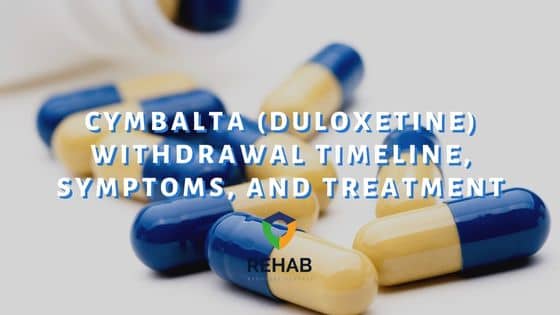Table of Contents
What is Cymbalta?
Cymbalta is a brand name for the medication duloxetine, a serotonin-norepinephrine reuptake inhibitor (SNRI). SNRIs are a group of antidepressant medications that are used to treat depression, anxiety, obsessive-compulsive disorder (OCD), attention deficit hyperactivity disorder (ADHD), fibromyalgia, nerve pain, and other pain conditions.[1]
Duloxetine may also be sold under the brand name “Drizalma Sprinkle.” Duloxetine is approved by the Food and Drug Administration (FDA) for a variety of health conditions, including generalized anxiety disorder (GAD), depression, fibromyalgia, nerve pain associated with diabetes, and musculoskeletal pain.[2]
Cymbalta works by balancing levels of serotonin and norepinephrine in the brain. When these two neurotransmitters are not balanced, individuals may experience pain or mental health symptoms. However, Cymbalta is known for improving mood, sleep, energy levels, appetite, and anxiety.
Cymbalta can be a life-changing medication for people struggling with mental illness or addiction, but it can be physically habit-forming. Even people who take duloxetine as prescribed by their doctor may experience symptoms of withdrawal when they stop taking their medication. The severity and duration of the Cymbalta withdrawal timeline vary from one person to the next, but it can be managed by slowly tapering off of the substance rather than quitting it cold-turkey. Cymbalta withdrawal may also be referred to as “discontinuation syndrome.”
Symptoms of Duloxetine Withdrawal
Anyone who takes Cymbalta for at least four weeks is at risk of having symptoms of withdrawal upon discontinuing their medication. Common symptoms of SNRI withdrawal include:[3]
- Nausea
- Dizziness
- Vertigo
- Muscle spasms
- Tremors
- Headache
- Irritability
- Vomiting
- Anxiety
- Insomnia
- Drowsiness
- Dry mouth
- Reduced appetite
- Muscle weakness
- Skin rash
- Constipation
- Mood swings
- Fatigue
- Sweating
- Seizures
- Depression
- Confusion
- Tingling
- Shock sensations
Many people who stop taking SSRIs and SNRIs cold turkey report experiencing “brain zaps.” Brain zaps are electric, shock-like sensations in the head. They can be overwhelming and uncomfortable, but they usually are not harmful.
Stopping Cymbalta can also lead to rebound symptoms of anxiety, worsened depression, and suicidal ideation. Individuals should always consult with their prescribing physician before stopping this medication.
How Long Does Cymbalta Withdrawal Last?
Antidepressant discontinuation syndrome sometimes lasts longer than withdrawal from many illicit drugs does. Most people experience mild to moderate withdrawal symptoms for about three weeks. In mild cases, people report recovering from their symptoms in just one week.
The severity and duration of the withdrawal timeline depend on various health factors, such as:
- Dosage
- Frequency of use
- Duration of use
- Physical health
- Genetics
- Medical history
Cymbalta (Duloxetine) Withdrawal Timeline
Duloxetine is a long-acting drug, so withdrawal symptoms typically don’t begin until 2-4 days after discontinuation. 65% of people recover from their symptoms after one week, but some patients have symptoms for several weeks.[3] Symptoms are generally most intense on days 5 and 6.
Tapering off Cymbalta Safely
The safest way to stop taking Cymbalta is to gradually reduce the dose of medication over time rather than stopping it cold turkey. This is a practice known as tapering. Tapering can reduce the severity of withdrawal symptoms, eliminate the potential for adverse side effects, and lengthen the overall withdrawal symptoms.
In some patients, tapering does not eliminate all withdrawal symptoms, but it does make symptoms easier to deal with.
Tapering without medical supervision can be dangerous, though, so this should always be done under medical supervision. The prescribing doctor can help the patient determine if quitting Cymbalta is the right choice and how to gradually reduce the dose. Most people can expect to taper off the medication under guidance for at least 2-3 weeks. The majority of patients do not require additional medications in order to cope with their symptoms and residential treatment is rarely needed.
How to Know When It’s Time to Get Addiction and Mental Health Help
Cymbalta is not an addictive drug, but it is dangerous to stop taking it without medical supervision. People who struggle with addiction and/or mental health are at an increased risk of abusing their medications and not adhering to dosing schedules. Quitting Cymbalta can also lead to depression relapse.
If you have abused Cymbalta or have suddenly stopped taking the medication without taking your doctor, you may be at risk for substance abuse, addiction, and rebound mental health symptoms.
If you or a loved one need assistance, please contact Rehab Recovery Centers today to speak with a mental health professional. We can connect you to the treatment you need.
Coping With Cymbalta Withdrawal
While tapering off duloxetine, you may still have some physical and psychological discomfort. Your symptoms can be eliminated further by caring for yourself and practicing healthy coping skills, such as:
- Follow your doctor’s orders
- Treat side effects with over-the-counter pain relievers or nausea medications
- Reach out for support from family and friends
- Eat a nutritious, balanced diet
- Get plenty of sleep
- Try to get some exercise
- Dedicate time each day for self-care
- Speak with a therapist
If you continue experiencing depression after discontinuing Cymbalta, be sure to speak with your doctor about alternative medications that may be right for you.
Find Help Today
Our qualified team of admissions coordinators is available 24 hours a day, 7 days a week to help you get the support you need. Call now for a confidential, risk-free consultation.
References:
Get Help Today
Don’t go through the process of recovery alone. There are people who can help you with the struggle you’re facing. Get in touch with one today.


